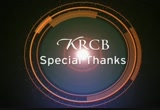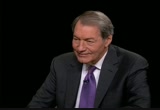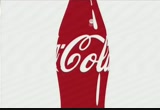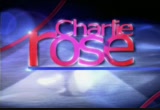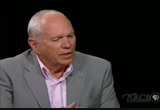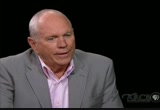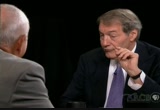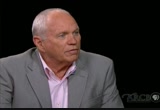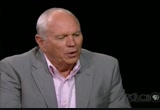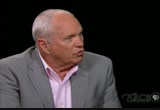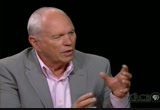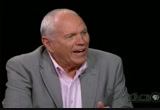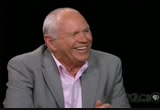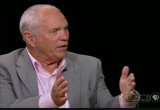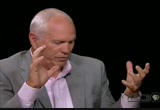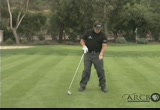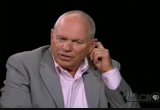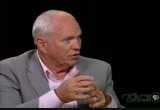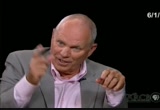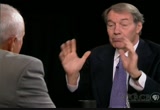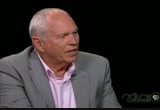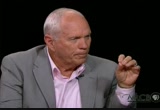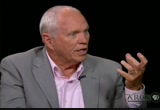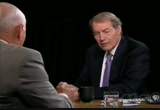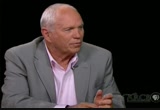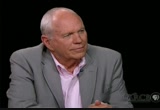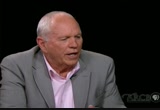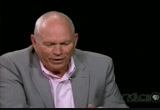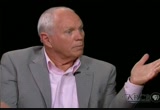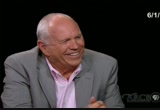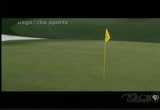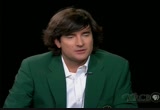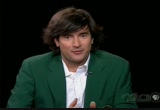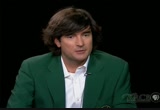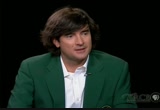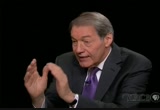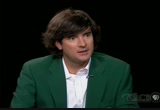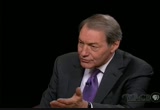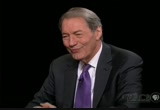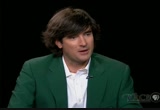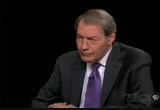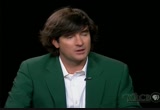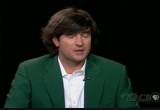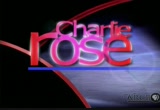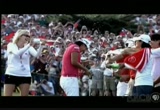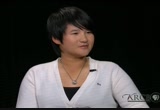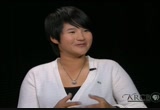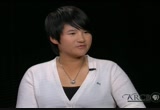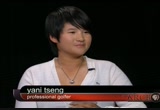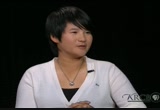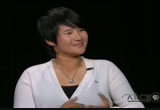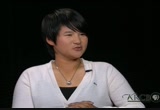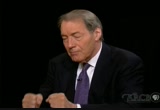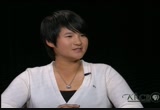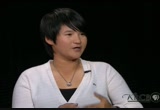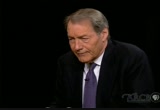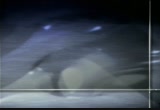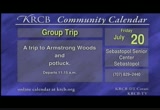tv Charlie Rose PBS July 13, 2012 11:00pm-12:00am PDT
11:00 pm
>> welcome to our program. tonight it is summertime and we look back at some of the people from the world of sports, especially golf. who have come to the table to talk about the game and the players. we start with butch harmon. >> one of the things people ask me all the time, do you have a system or a method. and i say no, i treat everyone as an individual. i don't have a system or a method. i say that the one thing that i do try and do and i learned this from my father is i try not to take a what i-- away what you do naturally. >> and continue with bubba watson. >> so i've just changed and realized that golf is 23409 that big a deal. it's gotten me some great things, some great press,
11:01 pm
gotten me some fame, money. but it's let me do other things that are really portant to me. the charity work, meeting with junior, doing journalier tournament, giving back to my community. doing all these great things. when it comes down to t winning a golf turn suspect great but doing these other things outside of golf is what it is all about. >> an concluding this evening with yani tseng. >> the first major and i think i'm four point away with the whole thing so that was the biggest dream. and so i'm working on it. so many things that i need to learn to achieve my goal and i'm just having so much fun. >> from the world of go, harmon, watson, tseng when we continue. funding for charlie rose was provided by the following.
11:02 pm
11:03 pm
>> butch harmon is here. he is widely considered one of the top golf instructors in the world if not the best. and welcome. >> pleasure to be with you. i know you love golf like i do. >> i do. >> we're going talk about every aspect. i want to us look at this book too. this is called the pro. a lessons from my ther claude hmon, senior. what de teach. >> you know, i think pretty much everything i know about its game started with my father. my father was so far ahead of his time he was a club pro that won a major championship. he won a masters in 1948. the last club pro to ever win. >> wing foot. >> and at sell follow and down at palm beach. and he was a person that was a great player, great teacher, great innovater. de so many things, teaching aids, using film before there was video. he had this insight and this way of dissecting what was wrong with something that made everything so simple. and i think one of the
11:04 pm
reasons myself and my three younger brothers have all been successful as instructors is growing up in our family. watching our father 9 way he taught, the way he handled different people. it didn't matter whether you were ben hoggan his best friend, it didn't matter whether you were henry ford t didn't matter whether you were just a normal person. he had this ability to communate unle anythi iave ev seen. i think i take everything i do from that learning as a youngster. >> am i correct in this he actually taught president kennedy president kennedy, president eisenhower. >> uh-huh. >> theres with a range of people. >> i think you could go to kennedy, eisenhower, nixon, ford and on true until my father passed away. he spent the wol time with many of the presidents, with many of the heads of industry. >> what do you think made him great. >> i think my father was a person that people liked to be around. he had a very gregarious and outgoing personality. he treated everyone the
11:05 pm
same. you could be the president of the united states. you could be working in a factory and you come to be with him. that was fine with him because you loved golf and golf was the tool that he used in his life. and he loved it so much and he loved being around people that liked it that he had this ability to make everybody feel relaxed. and he also was so good at what he did. everyone seemed it to improve when they came to him. >> so did you inherit this or learn this? >> i think both. i think it's in my genes and i also think i learned it from watching my dad. it's funny i have three younger brothers who were all very successful in the golf business. and years ago we were filming a thing for the golf channel at wing foot and were in the grow room and this older gentlemen came up to us and he said you know, boys i thought your family was really hard on you when you boys were young. i thought he crossed the line a few times. and my brother dick looked at him and said yeah, he was hard on us. he must have done something write because we all turned out pretty good.
11:06 pm
it was pretty interest. >> but for a moment it wasn't interest evident that it would turn out that way for you. you went to the bottom. >> i was the rebel of the family so, to speak. if someone told me it was black t was white. i don't know why i had this ability or inability to not like authority. i went to the university of houston on a scholarship. didn't even stay there a month. quit, i went in the service, ended up in vietnam war, i'm a vietnam veteran which i'm very proud that i did that for my nation. i went around 1979 and '80 to the lowest point of my life. i was versed, drank too much, gambled. i was as bad as you could get. i hit rock bottom. i think when i hit rock bottom the thick that saved me was my family, my father and brothers. they came to my rescue, my brother dick, especially, unfortunately he passed away five years ago. >> dick said move in with me. >> he said come to houston, move with me, i will find you a job.
11:07 pm
you got to get your head out of your you know what. and i did. >> rose: he got you driving. >> and he saved my life. i went to work for dave martin building golf courses, driving little dozers and tractors and worked my tail off. the thing, i think, that saved me is that i have always been a workaholic. and i think even in my downtime when i hit rock bottom i realized that i had to get my head out of my you know what. and the fact that i am a workaholic help immediate be that way. >> so what did you say at his u only-- eulogy, at his funeral. >> i had a hard time talking. i told my brother billy, you better go before me. i said because dick is so hard. and i will tell you what billy said first because it's hilarious. billy gets up there. we didn't know what bill was going to say. he is the youngest one. and this church in houston is just packed. there's like 1800 people, everybody is crying and soning because my younger brother dick was so loved by everyone. he was such a wonderful man. and billy kind of paused for
11:08 pm
a minute and he had tears. he goes you know, i know exactly what dad said to dick when he walked in to heaven and everybody kind of looked up. he said dad looked at dick and said dick, how did butch screw up that tiger woods deal. and i mean the whole church just cracked up. and it was the most beautiful thing because it got everybody celebrating dick's life for how good he was. well, what i said when i got up there is that i couldn't have stood before you today, the person i am, the success i am if it wasn't for my little brother. >> rose: he was there. >> he was there for me more than i could ever, ever begin to tell you. >> rose: so let me ask you this. how could you screw up the tiger woods thing? >> well, the tiger woods thing was very interesting. i started with tiger when he was 17. his father earl brought him to me. hi just got a lot of recognition because greg norman had won the british open in '93. and hi done a revamp on greg's swing and earl kind of enjoyed the things that
11:09 pm
he had seen in that. and tiger was in houston where i was. i was director of a golf club. and he had just lost a match in the u.s. amateur that was-- last match we ever lose in the amateur championships because he went to win three if a row after that he brought him over one day. i still have the tapement i would love to show it to you. as a matter of fact there is film on that video of that tape from 1993, the first time i ever saw this little 17-year-old kid. and earl and i-- as a rail. earl and hi a little bond because he's a vietnam veteran and i was a vietnam veteran. and neither one of us had much of a filter. we pretty much say what we think at all times, good or bad. and it was an interesting day to watch this young kid, first of all people say did you see his talent. yeah, it was unbelievable, his natural talent it wasn't polished. the talent wasn't polished but you could see. >> rose: it was that hand-eye coordination. >> it was just beyond belief, what he could do. i remember ask him, tiger, i have asked you hit balls now for 15minutes and we talked
11:10 pm
about a couple things. i said tell me, when you get to a hole where you absolutely have to drive the ball on the fairway, every great player has a little shot, most will tee it down low and chase a little draw out there or they will hold one off and think the out of the neck way little fade just to make sure the ball gets in the fairway. i said what do you do in pressure situations when you have to hit one in the fairway. i was trying to find out what was going on in his mind. he said i just hit it as hard as i can and wherever it goes, i find it and hit it again. at the time i said this is a brash little young guy to come up with something like that but the more igot know him that was what he did. he just pegged it and just let it rip. and he had no fear. wherever it went, he was going go find it he had this great creative mind and ability to move the ball all over the place. and i thought to myself, wow w that ability and that much confidence in himself this kid could really be something special. and then we went on from there to have some wonderful time and some great success. >> rose: what makes butch harmon butch harmon? >> well, i wear lot of hats.
11:11 pm
teaching obviously is my passion. i think everyone believes that i only teach famous tour players. i spent the majority of my team teaching with the average player. si have academies all over the world in due bye and ma-- dubai and macao and florida and las vegas but i spend most of my time for the average player. i do television for shall sky sports, as a lead analyst. i do all the major championships and big events. i have a great passion for troops first foundation where i do a lot of things for disabled veterans which i spend a lot of my time and effort with that. as a vietnam veteran i'm so proud to have t oprtunity to helphese kids in every way, shape and form. i have my corporate work with my sponsors with rolex and wing grips and jma services, titleist which i do a lot of work with. and then i have the most wonderful family. i have a great wife, christie and a wonderful 17-year-old and two great dogs and there's all my time. >> let's talk about some of the great players.
11:12 pm
take phil mickelson. he called you later in life. that was what, three or four years ago he called you? >> o 7ee. >> saying what? >> phil had never been a good driver. he has always been wild. he lost the u.s. open at wing foot because he couldn't find a fairway. >> even if-- suppose he had taken a three wood. >> yeah. >> but that's not his nature. did you ask arnold palm their question at the olympic club when he lost the-- coming down the stretch. that's how they play. >> he said you know, the thing i've always admired about your students is they're all pretty much long hitters but they all drive the ball very well. he said you took greg norman and made him the greatest driver in the world. i look at davis love the way he drives the ball. he said i've always admired the way tiger drove the ball and i need to learn to drive the ball better. >> so do i. >> well, we all do. if you look at phil mickelson's stats you would say he hasn't really driven the ball any better but he's drive ten light-years better because he used to miss the fairway way out here. when he misses a fairway now
11:13 pm
it's not by very far and can play. now he's aggressive and he is an aggressive player like arnold was. he's not the tactician that say nicholas was or a hoggan was. or even tiger. tiger learned how to win tournaments from the lead because i tried to teach him as a young kid the majors are the easiest to win if you have a lead because they have to come get if you. you don't make mistakes they have to push and you're going win. well phil has this go for everything attitude. but i have to say in our years together now, he is getting more conservative in how he plays. he's not jumping off the ground trying to hit it out of sight all the time. and i would never want to take his aggressive play away from him. i would just like to see him real it back occasionally and he's getting better at it. >> he has some heartbreaking losses because of that. >> yes, he has. >> rose: hertz breaking losses. >> but you win that way too. when he won the masters in 2010, thhot. >> roe: so how did you help him drive, what did you teach him? >> well, his lower body was over the place, if you remember phil's swing, his
11:14 pm
legs and hips were all over the place. he was never stable coming into the shot. so the first thing i worked on was trying to stabilizing his lower body. the big key was on his back swing for him his left knee would lock and his hip swlisd way to its left so he had to keep the flex -- >> slide like that. >> like you and i would slide. >> he's would go that way. and as he would do that he would reroute the club, get real long, way past parallel, reroute the club underneath him. then his leg was go all over. and he had a ta-way missment you can't play golf way two-way miss. you can play golf with a one way miss because you can play around it. you can play around it. >> adapt to it. >> you can try and eliminate one side of a fairway or another and you can get around a golf course. the first thing i had to do is stabilize his lower body. then as i stabilized his lower body, quieted his footwork down, didn't let him lift his front foot, because the more he lifted it, the more he put it down and we always put it down in a different place that kind of stabized it a little.
11:15 pm
by stabilizing the back leg, by keeping the flex in it, it didn't allow him to overrotate because he's very flexible. >> rose: take those that have been at the top. let's take hoggan, sneed, nicholas, tiger woods, phil mickelson, palmer, obviously. did they all have something that was beyond the effort, how much is it defined as some special raw talents that somebody saw when they wee young in ter's case his fher, and honed and got them on the track to building on this advantage they had from the beginning. >> well, one of the advantages all of them had is the good lord gave them a tremendous amount of natural talent, tremendous amount of natural talent. now the difference between the hoggans and sneeds and nelsons and all that. they were pretty much self-taught. that's why you put trevino and arnold in there too because their swings are very unusual. and i say this all the time.
11:16 pm
>> rose: because trevino taught himself. arnold was taught by his father. >> yeah, but still the swing was a limb different. jack was different. he had the right elbow, jack-- worked with jack nicklaus. modern day players all look the same because they've been the recipient of good instruction through the years. >> rose: and so much is video youtube, whatever. >> but the thing that changes is what's in here. all greatate lease-- athletes, i don't care what sport it is, we're going to talk about golf. have this desire to get better and they have this desire to beat you. and they have 100 percent belief in themselves. they have this killer instinct. they could be the nicest person in the world but when they go in between those ropes for four and a half hours they want to cut your heart out. they will have a drink with you afterwards but at that point in time they are totally focused on what they do. the two best at focusing were hogan and nicholas. they had blinders on. they just could get in their little mode and they could go. trevino had to talk all the time that was how he released his nervous energy.
11:17 pm
>> chicago rodriguez. >> but he wasn't quite as good as those guys but the same way. and then you have player who was just this world traveler, little bity guy at 5 foot 7, maybe, who just worked h tail off to show everybody he was good. >> and physically. >> he was the first one, frank strap alan was the first one then player came along. and then you throw tom watson in there who was phenomenal. he just had this able, they all had this able, charlie to reach down inside and produce when it absolutely has to happen. my father used to have a great line and i've always tried to tell my players this. look all the work we do, i don't care if it works on a range. it has to work on the back nine on sunday when you're coming down the stretch and everything is on the line. that's when you have to deliver. my dad used to have a saying. he said i will tell you when you know a guy who can really play, when it's sunday afternoon and it's the 15th hole and that red light on that tv camera is burning a hole right in his forehead and he knows it's burning a hole in his forehead and he just rips it
11:18 pm
down the fairway, that's pie guy. that's the guy that can play. >> rose: and those that have t you can-- how about bubba watson. >> well, bubba watson ask an interesting case. because he's kind of a throwback to many, many years ago. he has no teacher. he taught himself to play in his backyard with a wive el ball, that's why he curves the ball so much. and as you know and maybe the people watching this show may not know. it's not easy to curve the modern balls as much as he curves them. you could do it in the older dayings with the wooden club, softer ball. >> so when he had that to win the masters. >> there's probably. >> because he had been hitting wive el balls when he was six years old made a difference. >> i think made a huge difference. >> there are probably only two or three people that ever played the game that could hit that shot, nicklaus i believe said it. and it, sevy could have, they may be the only three that i know that could even attempt it. >> rose: i have a hard time understanding how a great player, what you can do for
11:19 pm
them. i mean you can help them see how they have slid into a mistake. or something that they have never done before that you are going to teach them how to do. >> let me explain it to you in a way that everyone can understand it. great players, a lot of times don't know exactly what they are doing in their swing. they think they feel it, they will say to you okay, you know, i hit this bad shot because i did this. and actually no, you didn't you lit this -- >> really w tape you just show it to them. really, i did. >> at the same time, one time i heard tiger i think say this and i don't want him to say he didn't say it. but basically one of the things he wanted to do, becausenew this, is to know where the club was at every moment. >> know where the club face is at every moment. >> that was something i talked to him a lot about. it goes back to my father. my father was such a good player, didn't practice much in his older years and always played good. and i used to say dad, how do you get up in age now, you're late 50s, early 60s
11:20 pm
and still go out and play pretty good. he goes well i always know where the club face is when i'm swinging. i know if the club face soap. i have to catch up. i know if the club face is shut coming down. >> is that just experience. >> i think it's an individual thing that has a great knowledge of the golf swing and can feel testimony and i try to teach tiger that at a young age. and tiger used to be able to save shots. you hear him talk about i get stuck all the time. he gets stuck because other than ben hoggan he has the fastest unwind of a body i've ever seen in my life. >> rose: tell with us what stuck means. >> stuck means that yur lower dy outruns yo arms. >> rose: your body is over here. >> and your arms are back behind you. tiger wood's body was the fastest i ever seen since ben hoggan. >> rose: . >> rose: so you could go from here to here. >> faster than anybody. the could save it with his hands all the time, and then what happens to great golfers, this is, people will say to me all its time, how can go and go-go-- so go from playing so good and instantly play so bad. well good players, especially ones that have a
11:21 pm
smoother rhythm can play from bad positions because they can feel it and they can catch up. and they mayo three or four weeks, they may win a tournament, they may contend in tournaments and feel like at the they're playing pretty good and each week this is getting a little worse and a little worse but they're catching up and they're timing it then all of a sudden they can't catch up and boom they miss a cut. >> we all want to benefit from somebody telling us how we can see things, help us see things that we can't see ourselves. but the thing that you most want to do is make sure that your own naturalness, your own sense of athletic athleticism is not suffocating because you were so preoccupied with a thousand tngs in your brain. >> one of the things people ask me all the time do you have a system or a meth. i say no i treats everyone as an individual. i don't have a system or a method. i said if there is one thing that i do try and do, and i learn this from my father s i try not to take away what you do naturally. i just try and improve on it. i don't want to take a swing
11:22 pm
because i think this swing is the modern swing it looks the best and i want to put that in your body. well, that's not possible. i have to allow to you do the things you do naturally but just make sure those are done a little better or the ub is on the right path. give you a perfect example. people say to me all the time with does tin johnson if you look at him his club face is shut at the top, his left wrist is like that fle said aren't you going to change him and get nim that position. i say i can get him in that position but he couldn't break 80 this is how he plays. that is where, the eye line is down the fairway as they clear their body out of the way and they can hold and strong they hold the left wrist. when dust injohnson first came to me i said look, i don't want you to think that i am going to change the shut position at the top because that's how youplay. i have seen this fore. he said yeah, david duval played that way. i said no my father played that way. i say have seen somebody play good. >> your dad was like. >> pie dad was like that at the top and future right there. >> and came down. >> but never lost that position.
11:23 pm
that's why he think the so good. >> rose: you told me adam scott has the sweetest swing. >> i would say mechanically i think adam scott has fundamentally as good a swing as there in golf. >> rose: what makes fundamentally as good. >> i think if you look at the positions, if you look at the club face angle on the back swing and the downswing, you look at the positions of the way the arms and the body match up together, the's some wonderful, slow motion superslow motion on this tape of two modern golfers that i use, nick watney and adam scott because to me they are the prototype of the modern breed the way they swing. when you watch adam scott swing in this superslow motion that we have it in from all the angles, pretty much every position is textbook, the way would you teach it. now not everybody can do that. but he has done it and it's interesting. when adam first started, first turned pro he played a lot with tiger because adam, i first met adam he was a teenager going to unlv. and in 2000 he played a lot with tiger. and we always thought that -- >> tig wear come out to vegas to practice.
11:24 pm
>> and hang out and adam swing was very similar to tigers when i first saw him. everyone thinks i created that. i said no that's the way he came when i saw him as a teenager that's how he swung. so we just enhanced it. and adam carried it and still has it to this day n his computer, some film i took of tiger woods, 2,000 at the british open in st. andrews. he just won the u.s. open by 15 and goes on and wins this by 8. and i think mechanically it is as good as a club can be swung. in every position that he got it. >> height. >> yeah, when you looked at it and adam used that as a model. and he always used that. i think today adam scott has fundamentally the best swing in the game. now there is a lots more to playing golf than a swing as you well know. but we all-- that's called job security for me. >> rose: finally you got all these guys to talk, fred couples, ernie els, stanley, sdusin johnson, phil mickelson, and tiger woods. >> uh-huh. >> did you ask tiger. did you say --
11:25 pm
>> i asked every one of them. these are guys i have had a lot of success with. in my career, as i said only two i regret i didn't get on there was sevy and ho hey maria. >> here are the section ball striking, basic fundamentals, balls, curves and drills, specialty shots, short game, the second dvd is putting it from good to great. that is when you see these guys in selecting clubs and finally fitness and golf and kids, women and seniors. the greatest golf in the world some say right now is a woman on the turn named it yani tseng. >> she is, she is unbelievable. she wins everything she plays in, absolutely unbelievable. >> rose: she sat here and she said to me in the eni believe in two things, grip it and rip it. >> sounds like a female john daly. >> rose: or a female bubba watson. >> exactly. you know, the neat thing about this tape, and it was a big project, took a year to do it, we had a huge budget to do it with. i tried to put everything
11:26 pm
that i have learned in all my years of teaching so i could share that with the average person. there is 250 tips in there, there is l kinds of drills and special things in there. and trouble shots. anything you could ever want to learn in golf we tried to put in there you don't have to watch the whole thing. it's two tapes, four hours long but you can go to the different sections. >>it will help you. >> yes, i think can help anyone. it's really geared to the masses. >> rose: so you can look at this and say what i can learn here. >> yes. i would tell you you can learn anything that you are having a problem with in your game you can learn it because of the fact, i try and make things very simple because that's how i teach. and i think people th have it will really like it. >> rose: i'm sorry-- sorry i never got, i would like to kur a friend. i'm sorry i never got to meet your father. >> would you have loved my father. he was a remarkable man. he was the greatest storyteller on the planet. he was just a fun person, as i said earlier he was hard on us when we were kids. i tell you two stories on me
11:27 pm
that are really funny. and eye-opening for me, when i was a youngster. when i was a teenager i was really a good player. won a lot of tournaments in the metropolitan area, metropolitan junior champion o, oand so forth but i was hot heated which is what kept me from being a good player on its tour because i was a perfectionist. if every shot wasn't perfect i couldn't handle it i remember playing, and arnold palmer was my idol. tried to dofering arnold palmer did. i was playing a junior tournament and got mad and broke my driver, made a fool out of myself. i know coming home that the pros already called my dad and said you know your son shot 78 but let me tell you, he didn't act very much like a gentleman, blah, blah, blah. and he would be correct, because i didn't. i walk in the den in our house and my dad is sitting in his chair. i know he knows exactly what i shot. and he says to me, how did you play today. >> i said dads, i didn't play very good i shot 78. it wasn't a good day. >> he said you know butch i don't know why you get so mad. you have never been any good. if you were arnold palmer he has a right to get mad, he's
11:28 pm
good. are you butch harmon, are you no good. and why do you get mad. then you think about it, well, i guess you're right so my rookie year on the tour, that's the other story, rookie year on the tour i missed the cut in cleveland. missed about four or five cuts in a row. and montreal its canadien open was the next weekend. in those days if you weren't a top0 money winner whi is the only way to be e eferment you qualified on mondays. we were called rabbits to go around and qualify to get in the turn. i called dad and said i got a flight, i get into laguardia. i get in about 1:00, get out at wing foot no later than 3. i really need to you watch me hit balls and in the morning on sunday if you could watch me again i have to catch a flight to montreal to try and qualify for the canadian open on monday. he goes what do you mean, i thought you were playing good. i said no, dad, i playedded terrible. i missed the cut. he said oh, i must have had the pame upside down. and i'm thinking to myself these are good lines. i just wish you weren't using them on me. >> great story. thank you very much. >> it's a pleasure to be
11:29 pm
with you. i admire you very much. your show, i love watching you. thank you for having me and anyone that is interested in the dvd go to butchharmondvd.com. we'll send it to you, dick's sporting goods and galaxy golf will carry it. for those who get t i hope you like to and i think you will. >> rose: thank you. >> my pleasure, pal. >> rose: bubba watson is here. at six years old he began curving plastic golf balls with a nine iron in his family's backyard. he has never had a coach or taken a single lesson. on sunday he was crowned the master's champion at augusta national. he captured the green jacket in dramatic fashion. on the second hold in a sudden death play-off against louis-- he pulled off one of the most imaginative shots in major championship history. >> go he do it. >> oh what a shot. look at it.
11:30 pm
snapping on the brian, incredible. absolutely incredible. >> another watson. he's wearing a green jacket at augusta. and this time his name is bubba. >> rose: i am pleased to have him at this table for the first time. welcome. >> thank you very much. >> rose: that shot, everybody's talking about it. when did you know that it had the affect you wanted it to have. did you feel it at impact. >> those, i felt like i didn't hook it enough. and then the crowd rushes in so you can't see t you know. are you feeling changes so you can't see it so the crowd rushed in, got out to the fairway. i heard the crowd roaring by the green and skid my caddie and he said about 15 feet from the hole. and i said it got all the way up there. he said yeah, i did. i said wow, that's crazy. >> rose: what were you visualizing when you took your swing. >> i was visualizing just a big hook. i was visualizing laying on
11:31 pm
the front of the green, maybe at best to the center of the green. but with the arenaline, swinging a little harder i got it all the way up there to the pin. and actually 15 feet from the hole somehow. >> rose: when louis hit that double eagle you said i almost wanted to go over and high five him. >> for sure. because as a golf fan, that's an amazing shot. and nobody has ever double eagled that hole. >> let's go to two. >> young south african. trying to use those slopes. this one could be very nice. could be very nice. oh, come to papa, yes! double eagle. >> rose: you want to go up and high five him sumply because of the lover of the game and respect for what he had requested. >> yes, for sure. as a friend of his, i mean
11:32 pm
as watching that shot as a golf fan, a golf fan of the masters, i mean that was just inkrebld. the crowd roared for it felt like five minutes it was just amazing, that shot. >> rose: winning the masters, wearing the green jacket, being able to go now to th winners' clubhouse, what does it all mean? >> it means that, it means that i have accomplished something in my life that i always wanted to do. i've got to do something great. but it means more to show my mom that her hard work paid off. showed my friends and family that their encouragement, their support has made off. >> rose: you love the game. >> i love the game. >> it's brought me everything. i went to many countries because of it i went to many countries before i even turned pro because of the game. the game of golf has brought me and my dad cser. brought me away to give back to the communities, give back to junior golf, give back to juniors. the youth in general. give back to many charities across the world. it's just exciting. the game has brought me some
11:33 pm
of in my life and some of excitement in my life. and somehow they pay me. they pay me to play golf. >> rose: they pay you well. >> yeah. >> rose: you brought your dad and you closer. >> for sure. >> rose: in what way? >> father-son time. at six years old, when are you playing baseball, which every kid i think does in america, but when are you playing beball, basketball, your dad is just watching. he doesn't get to play the game with you. yelling at you, screaming, cheering you on. but he doesn't get to play with you. and golf lets us ride in the cart together it lets us for four hours, five hours on slow rounds hang out, just us two. his bad shots, my bad shots, our good shots we celebrate that together and i think it brought us closer together, as a father son time was the bonding was better. >> rose: when did you know you had something? >> i got lucky enough to shoot in the 60s at age 12. >> rose: that will tell you. >> anthen i happened to shooin aournent round back there pensacola, i shot 62 one time, 10 under, 10 kbirdies and 8 pars.
11:34 pm
>> rose: and what do you attribute it to? is it natural, is it the fact that you had something that other people didn't, was it natural athletic ability. was it mental ability wa, was it? >> definitely not mental. i think it's just athletic ability, just something. my dad was an athlete. my mom is, can play sports, you know so, i think that all that combined i was an athlete. >> rose: but was it especially because of-- only for golf or could you have done that in basketball as well? >> basketball, is a little slow. i was a pretty good pitcher. i played pitcher, first base for years. don mattingly was my favorite baseball player, a great yankee. so baseball is what my dad want immediate to be. he want immediate to be a pitcher for the yankees. he was up set the day that i chose to go golf and no more baseball. but now obviously he probably really enjoys it. >> rose: i bet he does. when you were playing along side there in the final round with louis and he hit that double eagle, you said
11:35 pm
to yourself what a great shot. but you also said to yourself, i can page a lot of birdies on the back nine. >> uh-huh. >> rose: where did that come from? >> knowing, you heard roars all day. when i got to the course, bo van pelt shot 64 with a couple eagles and a hole-in-one. so you heard a bunch of roars and you knew sunday at the masters is always wild, always great, great theatre. and so i eagled both holes on the back nine on both par fives before. three putzed the first hole, birdied the second hole after he double eagled so i was only three back him. and he was leading at the time. so i was just focused on what i had to do. i didn't think about catch him right away i just tried to play steady, play my game and hopefully make some birdies coming down the stretch. and somehow i did. i made four in a row on the back nine. >> rose: yes, you did. but when you got to the 18th you could have won it there with a putt. >> yeah, hi about, the first putt on its regulation was about 18 feet. just didn't break as much as
11:36 pm
i thought. just left it on the high side. and then notice play-off i had a 10oote >>rose: on its first 18. >> on its first play-off hole. >> rose: which was the 18th. >> and just missed that, that one broke, the other one didn't. >> rose: what was amazing to watch it t didn't break. you almost were confounded by the fact it didn't break, like ball, you didn't go where you were supposed to. >> right, louis on his putt on the play-off didn't break at all and stayed on the high side, stayed on the lip. if his broke like mine he wins the masters and somehow his doesn't break and somehow mine does so we went to the next hole and the shots that everybody knows. >> rose: yes and we see over an over and over. d wi t wll live in golf history. there is also there, this motion that you , it's a kind of, as i said to you this morning we had a young woman golfer named tseng who you know who is wing everything on the women's tour. i said what is your attitude. she said grip it and rip it, that is a bit of yours too. >> yeah, my thing was always
11:37 pm
hit it g find it and hit it again that is what my dad told me. hit it, go find it and hit it again and don't worry about what situation. >> rose: and why noessons. i was improng. pie dad saw it was a fun game. no reason to get technical. all this technical stuff is not for me. and i was improving. each year we saw the ladder, i was taking a step up each year. and i said no reason to get anybody involved. just keep doing your thing. just keep getting better and better. >> rose: do you practice a lot. >> i play golf a lot. i don't like to go on the range that much. i just love to play golf. when i'm at home i play 18 holes or 36 holes a day. >> rose: and is it a teaching phenomenon for you if you are just simply playing. >> i say by playing i'm playing all the shots, under the tree, in the fairway, in the bunkers. if you are on its fairways you always have a perfect lie. >> rose: is that part of the reason that you can recover well as did you in the masters. >> well, over the course of my career i have been in the rough a lot.
11:38 pm
so i'm used to testimony and playing at home, you go for the fence and you hit it as hard as you can so are you in the trees a lot. and i so yeah, i'm used to recovering, used to hitting those shots and they don't scare me. >> rose: have you ever played it safe? >> i played it safe-- . >> rose: lay it up is not a word that you know. >> i hate laying up. i lover the chall ek. i love trying to do something that hasn't been done or it's hard to do. not for fame or for the crowd but just for me as a person. me and my caddie talking and trying to improve him. >> rose: has there ever been a moment whether it was last year or five years ago that you wondered whether bubba would do what bubba was capable of doing. >> for sure. i would say three years ago, two years ago, three years ago, my caddie came to me, we sat down after the u.s. open qualifier which i didn't qualify for. and he said that i can't watch this. you are my good friend. i'm making a lot of money off of you but i done care about that. i care about you as a friend.
11:39 pm
he said i'm going to have to walk away if you don't change. and my wife was saying that for years that you need to get a better attitude. bubba off the course was some of better than bubba on the course. i was going the wrong way, very angry. a lot of envy, why can i not perform, why have i not won. why have i not ranked higher in its world. >> rose: are you were your own worst enemy. >> exactly. that is note o the course. off the course coy care less about anything. i didn't care what people said about me. i was a fun loving bubba. twitter helped me out with that. so it was just something, it came to me and really hit home. they fessed up, my frayner, they came to me and put their arm around me and said we need some change. >> rose: almost like an intervention. >> for sure. and it showed me a lot of guts. it showed a friend that didn't care, obviously didn't care about making money off me. didn't care about what i did on the golf course. he cared about me as a person and that's not me.
11:40 pm
so he want immediate to change. and it's relaxed me a lot. and it's help immediate a lot and it's help immediate a lot gain fans through twitter, to see me on the golf course and see me who i am now. and then to your whirlwind i have won four times and one happens to be the major, the green jacket. >> so when you changed. when your caddie comes through as a-- to you as a friend and says you got him. i love you and you've got to change. how did you change? >> you know n 2004 when me and my wife got married two months after we got married we got baptized together. being a christian, being a believer, i was just, my biggest downfall was the golf course. i was just looked mean. really going through tough times because i wanted to win. envious which is not good. a lot of these things that weren't good. we all have problems but that was my biggest problem inside the ropes so they came to me and made sense. i understood it i knew i was going the wrong way so when they came to me it really hit home.
11:41 pm
got deeper in the word. started understanding the bible more what true fwrejds are all about. so i have just changed and realized that golf is not that big a deal. it's got me some great things. it's got me some great press, fame, money. but it's let me do other things that are really important to me. the charity work, meeting with junior, doing junior tournaments, giving back to my community in pensacola, doing all these great things. when it comes down to it, winning the golf tournament is great, but doing these other things outside of golf is what it is all about. >> rose: you have a master's championship, you have a new boy. nothing would have been better than to have your dad see this. but he clearly, you had a chance to talk to him about what you were going do and what it was going to be and how much he meant to you and how much golf he had helped you love. >> it was-- yeah t was crazy. he went to the first masters, couldn't walk. he had rheumatoid arthritis for 19 years so he couldn't walk along distance. sow was, his joints were killing him but he stood on
11:42 pm
the 9th green and watched me my first year at the masters. enjoyed every minute of it. then he got to see me after we, after he got cancer, nobody knew about it, we tried to keep it hush hush and then when i won in travelers in connecticut, that is when a nounced that heas aut o was away of cancer and was struggling real bad. we knew it and then i made the ryder cup team. finished second. so he got to see me almost win a major. and the better i played, the mover i was on tv so the more he got to see his son on tv. and made the rider cup. he got to watch me in that, and wales. we lost but he got watch his son in the ryder cup with the usa flag. as soon as i got home from that, nine days before he passed, i spent nine days by his bedside. >> rose: it makes you understand exactly what father-son is about, doesn't it. >> sure, yeah, it's crazy. we only had kaleb two weeks and hi only been there five days and it's just amazing.
11:43 pm
>> rose: yani t-- tseng is here, top ranked female golf never the world, l pga player of the world in 2010 and also 201 -- i'm pleased to have her here at this table for the first time. welcome. >> thank you. >> rose: who taught to you play. >> my parents. my parents since i was five start golf and my parents they both playing golf. but i am only one kid playing golin my hse. >> rose: in other words, how many sisters and brothers. >> one older brother and one younger sister. >> rose: they didn't play golf. >> just me. i love it. i love every challenge on the golf course. my parents really give me a big support. >> rose: yes. so why do you think you have done so well? natural talent. >> yeah, i think-- . >> rose: you were hungry, what else. >> i think i enjoy, having so much fun. i'm very lucky. you know, i have a job that i really like and i'm enjoy every moment. doesn't mat ferr it is winning a tournament or losing a tournament, but i'm enjoy, i really have so much fun playing golf. >> rose: is there anything about your game that you
11:44 pm
would change. hard to imagine anything. >> i don't think so. i think keep enjoy and keep smile. this year my goal is smile more on the golf course and having so many things i can do outside the golf course. keep improve myself and keep learning. >> rose: is there a lesson to be learned from the experience of michelle wei? >> probably not going to play the men'sourment lz very good one. >> i means that's one. >> rose: i think you have a second career as a comedian if this doesn't work out for you. >> so i won't think about that. i got a request for the rico open to try and play this year but no, maybe in the future, like annika s she is such a ledge en, maybe in the future if i have some reason i can go play. >> rose: did you grow up with a role model. >> yes, annika was my big superstar. and i think because of her, you know, like when i was
11:45 pm
young i told myse one day i wt to playith annika. >> rose: and did you. >> and then i did, yeah. and now living at her house now, just incredible. like a dream come true. >> rose: has every dream come true for you? >> mostly. the major, first major, i think i'm four point away with the whole thing. that was biggest dream. and so i'm working on it. so many things that i need to learn to achieve my goal and i'm just having so much fun. >> rose: you can win the u.s. open? >> i will do my best. i mean i got big advice from annika. >> rose: what did she say. >> she say i have to-- before when media was asking me dow want to win a major, do you want to win graceland, i always say no i don't want to think about it too much so every time i get there i kind of feel lots much pressure so annika told me to just face t even at the beginning of the year, say yeah, that's wah want. you want a grand slam, you
11:46 pm
want a u.s. open. so when you get to the u.s. open, when people ask you that question, and are you not afraid any more. >> rose: yeah. at'she best thing about your game? >> i don't know. i mean i just-- . >> rose: it all seems to work well, doesn't it. >> it's getting better. i think i'm adjust relaxed because i know the more enjoy i play the people is going to more enjoy, the people going to enjoy to watch too. >> rose: the more you enjoy, now are you enjoying it more now that you are winning more. >> yeah, of course. i mean my coach always tell me if you play like this, i mean if you don't like this, you don't line -- >> if you don't like this, was's there to like. >> yeah. >> so but you continue to practice hard i mean you just told me you went out to the driving range to see if you could duplicate that shot. >> yup. at first i working very hard. but just need to keep
11:47 pm
walking, learning from the tournament, learning from the mistake this is my fifth year on the tour. i mean like i love to watch masters. you can always learn something from that. so many magic shot there and you always can lrn and workin >> golf is very popular in asia. >> it is. >> rose: hugely popular. >> it is. and in taiwan was getting there, it's not as good, like japan and korea. but it was getting there. i mean especially golf is in olympics in 2016. i means that's luge for the chinese golf in china and taiwan. so we're all very excited about that. >> rose: so you are excited to be in the olympics. >> i am very excited. >> rose: what other goals do you have in life? >> i was anying in the future i wants to have golfing in china and to help more kids because i love little kids so much. but i don't know how to play with them but i love them. so i wish in the future i can help more people, playing golf or like go
11:48 pm
study and dot things that they can do. >> rose: do you play an aggressive game? >> i am very aggressive. >> rose: i know. what we call a leading question. >> yeah. so i mean i always learning from mistake. >> rose: . >> i mean i always very aggressive. i think it's more fun. more fun to play. in the par 5 you can reach. if you are in the water. >> rose: if you can reach it in 2, reach it in 2. >> yeah, why you want to layup? >> rose: so that's why. >> never lay up when you can go for it, is that you what say. >> yes. >> rose: never lay up if you can go for it. >> yes. >> rose: take out, let it rip. >> yeah, that's what i always say, grip and rip it. >> grip it and rip it, yeah. >> rose: now who taught you that. >> my coach. >> rose: your coach did. >> yeah, grip it and rip it. >> yeah, when i was young like first coach hi iave in taiwan he just told me hit as hard as you can. don't worry about where the ball is going.
11:49 pm
>> rose: is that right. >> yeah. >> rose: and that is what arnold palmer's father taught him as well. hit it as far as you can and will you control it later. >> yeah so, after a couple of years when i was 7 or 8 and i start to control my swing betzer, controlling the ball better. but first couple years i was just grip and rip t hit as hard as i can and the ball was going everywhere but it was so much fun. for its kids, it was just fun. >> rose: today if you play, in most of the tournaments you play in, do you keep it in the fairway out of say 14 out of 18 fairways or -- >> no, i wasn't that good to keep on the fair waste. it was getting better. i'm learning from the mistakes. like first couple career, i look at my stats. driveway accuracy is over 100 rank so i was very opposite. i was like no, i finish top x how can i 100 with driving accuracy. >> rose: no the so good. >> so after a couple of
11:50 pm
years i realize i need to be more csistent with my driving accuracy so i work on a lot of woods, driver and strategy too, try to keep on the fairway more. so this couple yoof year my driving accuracy is getting better, back to top 50 or so what how would you like to be in the top five in grifing accuracy. >> because i-- i'm kind of a long hitter. >> rose: 270 yards. >> yeah so, i moan. >> rose: is tiger a hero in terms of the golf me he plad. >> it is. especially when he hits everywhere and he always recovers. >> rose: phil can do that too. >> yes, phil can do that 250. >> rose: whos are top five greatest women golfers of all time would you say. annika would be one. >> annika mickey wright going way back. >> yeah. and loreno ochoa. i really like julyie, it was
11:51 pm
some of fun to play with her. and for right now i think maybe patsy shin, yeah, those i think is really 9 role model that i can learning from them. >> rose: tiger obviously it two goals. one was to win pore grand slams than anybody, jack nicklaus has 18, he has 14. >> it. >> rose: he also won all the grand slams in one year over a longer period of time. not in fact a trick calendar year. you can win all the grand slams? a year. >> i am trying to but i just missed the-- i tell myself if i want to win, i have to n this. but i do my bst. and sometimes the harder you try, the worse you get. >> rose: now nicholas had palmer. or palmer had nicholas. there was a while that they thought tiger and phil might be, you know, they feed off each other. do you need somebody that is very competitive with you so
11:52 pm
you can feed off that person and have a real competition. >> i think so we have so many great players on the l pga, suzanne, they all very, very good players. so i mean we kind of push each other to get better and better, so i mean we, like when we put on the chus, every player has a different style, i'm aggressive, some people play very smart so you are learning from each other and to get better. and it was so much fun to, when are you on top and are you competing with other players and there is just, it's fun, and so many things. >> can we be aggressive and smart at the tame time. >> that's what mi learning now it that is the way i want to learn so i think i'm still a little more like aggressive but i played a little smart so my caddy helps a lot. >> rose: really? how does he or she help new. >> i mean he is a strategist, sometime i want to hits a driver he said no i think we can hit rescue mere. it's not a long hole. you hit a rescue and i still have maybe 1, lunn -- 20.
11:53 pm
i yeah that makes sense so i hit a rescue so we have been work together about two years and i think he helps a lot. >> rose: tiger and hoggan used to say they knew where the club was at every moment. they had a sense of -- down have that feeling you know exactly where it is? >> yeah, i do. i mean like sometime you feel like you just want to go for it. this is the way you feel. you feel like you can get there. you feel like this imagined shot, you can hit it and sometimes you just do what your instinct, i mean just really pray for it. >> rose: other than grip and rip what's the best advice you have received? >> like i say, i think the face-- then annika was showing me that you always need to have a goal. >> rose: a goal. >> yeah. doesn't matter it is a big goal or a small goal or like something very little. i think that's one that everybody should have. like for me rht now, even i'm like on top but i always have a small goal, long-term
11:54 pm
goal and short term goal to give me lots of motivation to improve myself. >> rose: when are you on the driving range do you have a goal. >> yes, i do. >> rose: just depends what part of the game are you working on. >> yes. example for the off day, off week, when gi to driving range to practice for like three hour, i whether say today i will focus more on the show game, on-- shorts game, long game or on my swing so that way every day i don't feel like i was just go prtice and. it didn't work out so i mean when i have a goal it feels like more fun to practice and i know what can i do to improve myself. >> tell me about your life when you're not playing golf. >> oh i want to go shopping. i like watching movies. i like watching other sports like tennis, basketball, baseball. and i like to stay home and hang out with my family, my friends. >> rose: now what about education and your own sort of learning and being able
11:55 pm
to have a continuing, you know, learning experience beyond golf. >> you know i'm still in university in taiwan, sports in university. so i like to study. i mean like for me people always ask heing me f you are not a golfer. i say i would love to be a student. i like to hang out with classmates in school to learning so many different things. and in the school, so i means that's why i'm still at university. i want to keep learning and i think this is going to help a lot. >> rose: muc success t you. yoare a pleasure to talk to. >> thank you. >> rose: thank you. captioning sponsored by rose communications captioned by media access group at wgbh access.wgbh.org
11:56 pm
132 Views
IN COLLECTIONS
KRCB (PBS) Television Archive
Television Archive  Television Archive News Search Service
Television Archive News Search Service 
Uploaded by TV Archive on

 Live Music Archive
Live Music Archive Librivox Free Audio
Librivox Free Audio Metropolitan Museum
Metropolitan Museum Cleveland Museum of Art
Cleveland Museum of Art Internet Arcade
Internet Arcade Console Living Room
Console Living Room Books to Borrow
Books to Borrow Open Library
Open Library TV News
TV News Understanding 9/11
Understanding 9/11